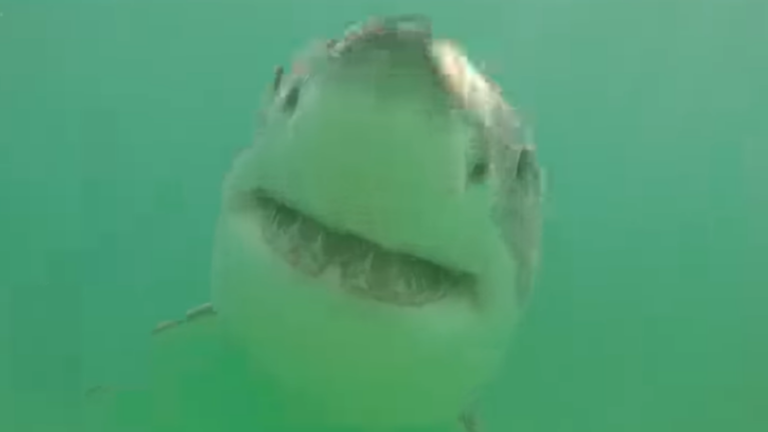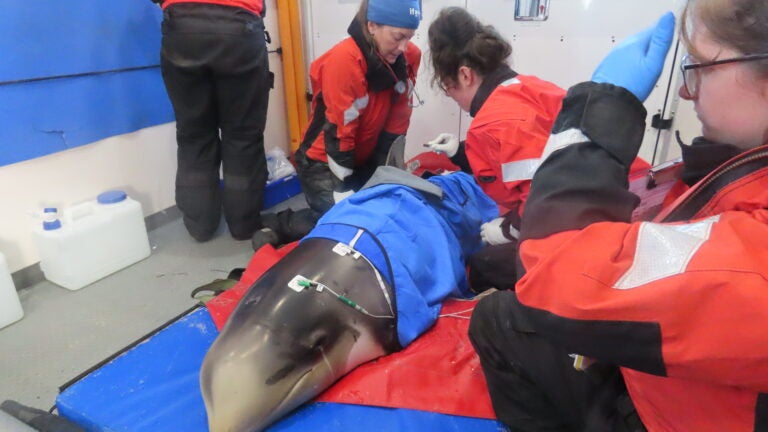Newsletter Signup
Stay up to date on all the latest news from Boston.com

Apparently New Englanders aren’t the only species that loves Cape Cod — white sharks do, too.
A new study from the Atlantic White Shark Conservancy, UMass Dartmouth, and the state fisheries division found that the Cape is one of the biggest hotspots for white sharks in the world.
The study estimated that around 800 white sharks visited the waters off Cape Cod between 2015 and 2018. This is the first estimate of white shark abundance in the western North Atlantic Ocean, the study said.
“It’s only a small segment of the population, but previously we knew nothing about numbers of white sharks here in this part of the world,” longtime white shark researcher Greg Skomal told NBC10 Boston.
To come up with their estimate, the researchers created a new statistical model that accounted for shark migratory patterns. They then utilized over 2,800 videos from 137 research trips to track the sharks and their movements.
The researchers ultimately identified nearly 400 individual sharks, and using the new model, they estimated that the actual number of sharks that visited Cape Cod during the four-year study was around 800.
Cape Cod's pristine beaches attract an increasing number of white sharks. The Atlantic White Shark Conservancy is working to better understand their behavior and find ways to monitor their locations to help keep the sharks and beachgoers safely apart. pic.twitter.com/aG3RKKIDfb
— CNN (@CNN) July 28, 2023
The study says its findings will aid white shark conservation efforts because researchers now have a baseline by which to evaluate the current white shark population.
White sharks are an endangered species, with a world population believed to be fewer than 3,500. The biggest threats to their survival are shark hunting by humans and fishing gear entanglements.
White sharks come to Cape Cod to hunt seals in the summer, but this was not always the case, according to Scientific American. There has been a surge over the last decade as the area’s gray seal population rebounded with the advent of the Marine Mammal Protection Act of 1972, the magazine wrote. Before the act was passed, seals were frequently culled by fishermen.
Cape Cod now joins the ranks of white shark hotspots such as South Africa, central California, Mexico’s Guadalupe Island, and Australia’s Neptune Islands, Scientific American reported.
Atlantic White Shark Conservancy Scientist Megan Winton, the lead author on the study, told WCVB that the study also found that the white shark population is increasing every year. She said she found the number of sharks coming to Cape Cod encouraging, and that the study tells a conservation success story.
“We’ve got sharks responding to the presence of seals, doing their job feeding in these areas,” Skomal told NBC10 Boston. “It points to the restoration of an ecosystem, and I think that is good news.”
Even so, Skomal told the news station, even if the shark population has increased since 2018, it will likely level off, if it hasn’t already.
“At some point we believe the population is likely stabilizing at a pretty consistent number, just given the fact that you’re dealing with a limited area that has a limited carrying capacity,” he said.
Winton clarified that the estimated 800 sharks are not all coming to Cape Cod’s waters all at once.
“I really want to reiterate that the risk of anybody out there having a bad encounter with a shark does remain low. They’re very cautious, selective predators,” she told WCVB.
Those concerned about Cape Cod’s growing white shark population are encouraged to download the conservancy’s Sharktivity app. The app keeps track of shark sightings in New England by researchers and civilians in real-time.
Each year, the app’s reports temporarily shut down beaches as officials try to keep swimmers safe.
Stay up to date on all the latest news from Boston.com

Stay up to date with everything Boston. Receive the latest news and breaking updates, straight from our newsroom to your inbox.
Conversation
This discussion has ended. Please join elsewhere on Boston.com